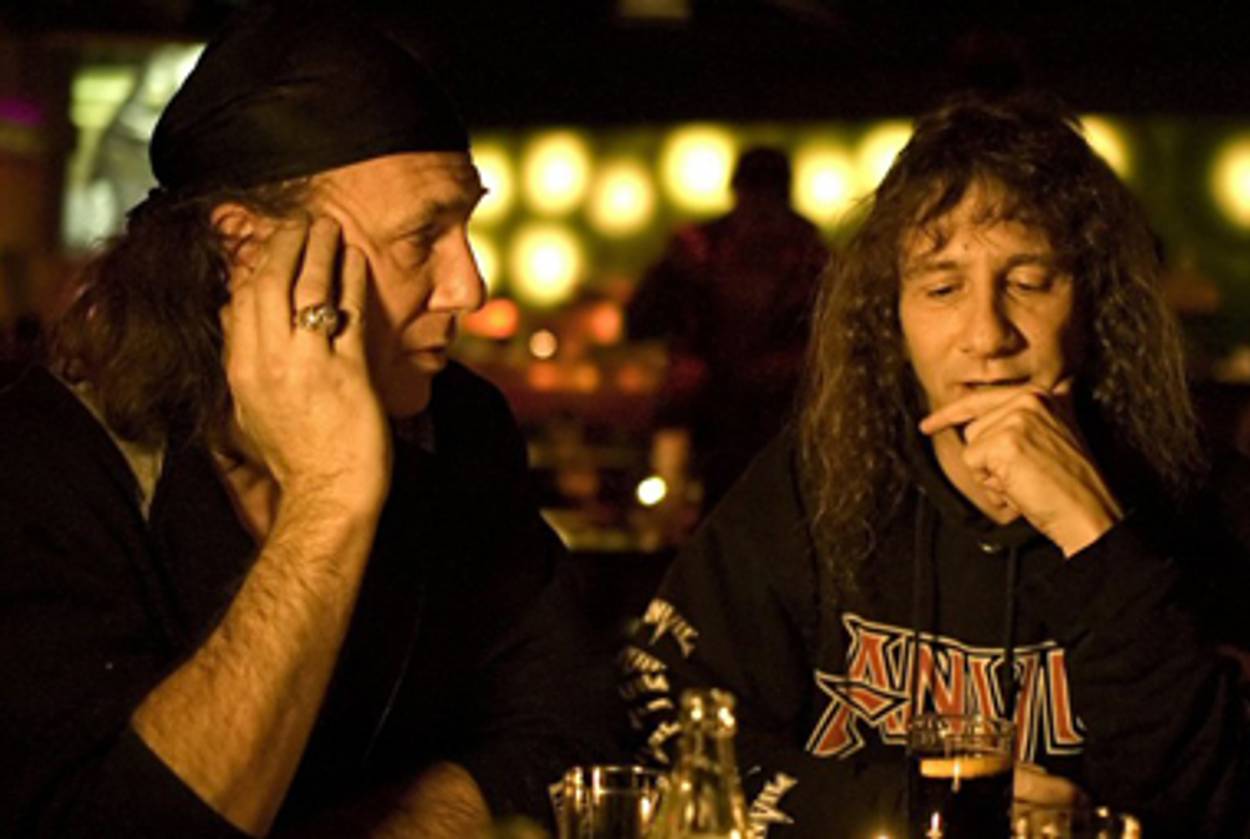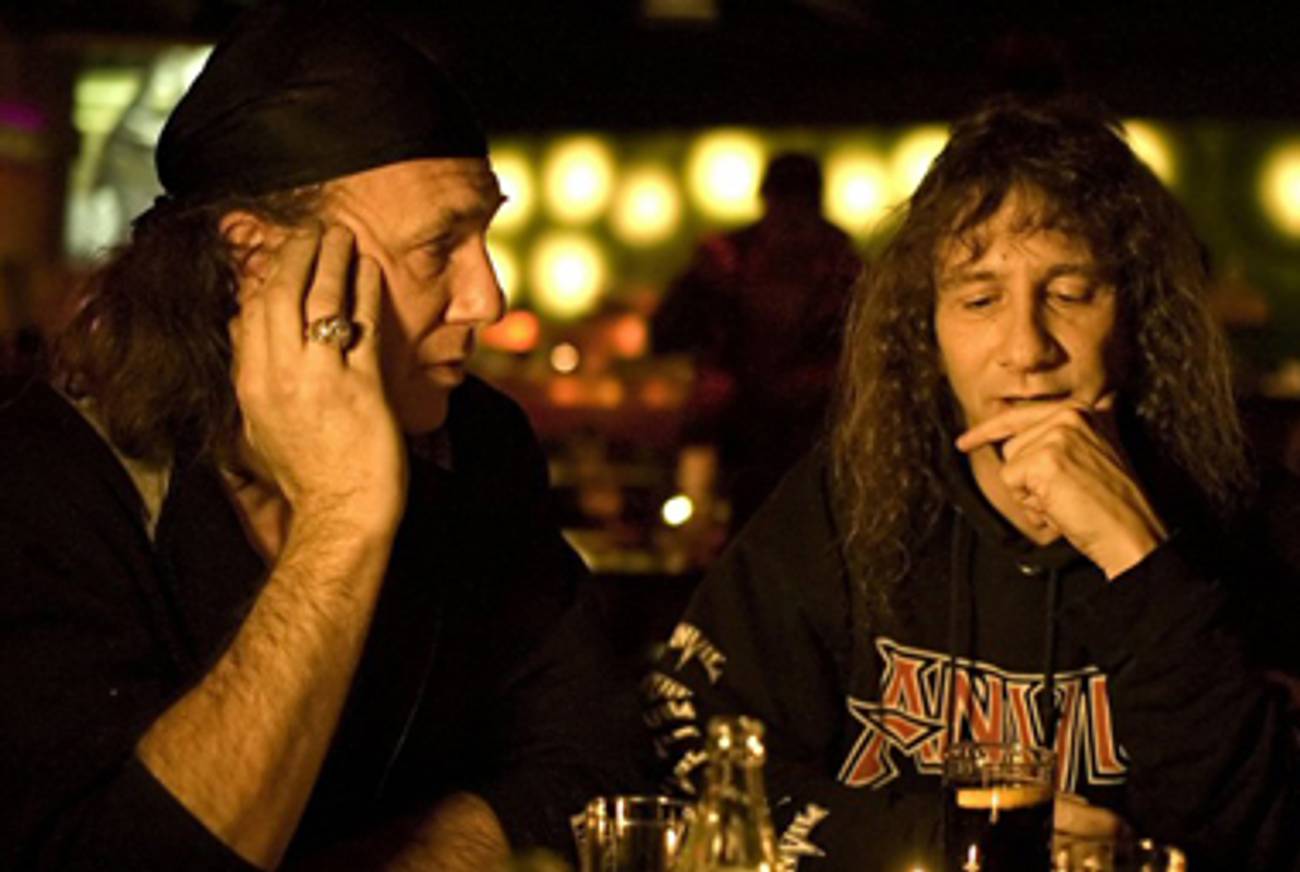Proving Their Metal
Thirty years ago, two Jewish kids from Toronto swore they’d never stop rockin’. They never did.




Anvil is the greatest band in the world.
Not, maybe, when it comes to their music: arguably, other bands — you know, the Beatles, the Stones, the Who — have produced more masterful and memorable music.
Nor, mind you, when it comes to popularity: unlike many of the bands that started out with Anvil in the early 1980s, bands like Bon Jovi or Whitesnake or the Scorpions, Anvil had a brief brush with fame and then faded out of the public eye.
But Anvil didn’t care. The band’s guitarist Steve “Lips Kudlow” and “Rabbi Robb Reiner” stuck together, taking pedestrian jobs to pay for the albums they continued to record and release. They never stopped playing, never broke up, never lost faith. And that is what makes Anvil a truly great band.
Their story — deftly captured in the new documentary Anvil: The Story of Anvil — has been an unlikely one from the start. Two Jewish kids from middle-class families in suburban Toronto, Kudlow and Reiner met when they were 14, promised each other that they would never sell out and always keep rockin’, and started a band. They wanted to sound just like their musical idols, Motörhead and Black Sabbath and the other heroes of hard rock in the late 1970s. They wanted to take over the world.
For a while, they did. They recorded a few albums, got noticed, toured all over. They played for packed arenas, standing out not only for their fierce music; Reiner, the drummer, is largely credited with inventing a rapid-fire percussion style that has birthed a subgenre of heavy metal called speed metal”but also for their stage antics, which included playing guitars with colorful dildos and wearing ridiculously risqué leather outfits. For a year or two, Kudlow and Reiner were rock stars.
And then, they weren’t. Poor management, flaky record executives, and a fickle market that quickly abandoned heavy metal in search of the new big thing all contributed to leave Anvil, so shortly after the band’s stellar debut, without a record contract and without fans. Kudlow and Reiner returned to Canada, got day jobs, and started families.
Here, however, is where the story gets both very uncommon and very Jewish: instead of hanging up their instruments and succumbing to the doldrums of suburbia, Kudlow and Reiner kept Anvil alive. They invested every cent they could spare and recorded album after album, releasing their work themselves and selling it to the small and dedicated circle of fans that remembered the band’s heyday. Every few years, they’d scrape together enough cash for a miniature tour, playing for exceedingly small audiences. But they didn’t care: they had faith.
And it paid off. In 2006, Kudlow and Reiner got a call from Sacha Gervasi; in the early 1980s, Gervasi, then a hard-living British teenager, snuck into the band’s dressing room after a concert and asked to join their tour as a roadie. Enamored with his enthusiasm, Kudlow and Reiner agreed, taking him along on their North American tour. As Anvil spiraled into anonymity, however, Gervasi became a star, writing the screenplay to Steven Spielberg’s The Terminal as well as a few other successful films. Looking for a new project, he called his favorite band, and was amazed to learn that they were still hanging on. He suggested a documentary.
The result, opening in theaters this weekend, is at once hilarious, inspiring, and heartbreaking. Often referred to by critics as “the real-life Spinal Tap” — the comedy masterpiece about an aging, unloved metal band directed by Rob Reiner (no relation to Robb Reiner of Anvil) — it captures the two musicians as they take one last stab at glory. Smitten with the warm, funny and engaging rockers, journalists and bloggers began hyping Anvil, and when the movie hit the film festival circuit, in 2008, Kudlow and Reiner were invited to all the hippest venues, including England’s prestigious Glastonbury music festival. But it was at an appearance at the San Francisco Jewish Film Festival, not usually a venue for heavy metal musicians, that the band had its moment of clarity.
“At first,” recalled Kudlow, “I thought to myself, what are we doing here? We’re called the ‘Jews of Metal’ sometimes by fans, but being in this festival of Jewish movies, it was a bit weird for a musician like me, you know? But then, I had an epiphany. All of a sudden, it hit me. You know, Robb’s dad is a Holocaust survivor, he was in Auschwitz. And I thought that him surviving was the beginning of this miracle. Talk about faith, man. Talk about destiny. Because of his survival, Robb was born, and we met and became friends and started Anvil. And here we are, here we are.”
Listening to his friend speak, Reiner smiled coyly. “Lips said all this to me in San Francisco,” he said. “I thought it was just another one of his revelations. But then, a few weeks later, we’re at Michael Moore’s film festival, and he gets up on stage to introduce us, and he says the same exact thing Lips said, that we have to thank God my dad survived Auschwitz, because otherwise there’d be no speed metal.”
And thank God they do, for all of it. “I’m not really wrong,” Reiner said, thinking back of all those years when all those people said it would take a miracle for Anvil to succeed. “I’m not really wrong for believing in miracles.”
Liel Leibovitz is a senior writer for Tablet Magazine and a host of the Unorthodox podcast.